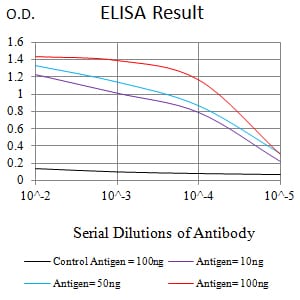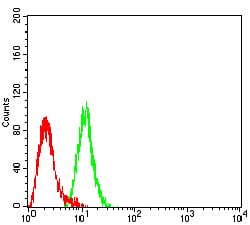

| WB | 咨询技术 | Human,Mouse,Rat |
| IF | 咨询技术 | Human,Mouse,Rat |
| IHC | 咨询技术 | Human,Mouse,Rat |
| ICC | 技术咨询 | Human,Mouse,Rat |
| FCM | 1/200 - 1/400 | Human,Mouse,Rat |
| Elisa | 1/10000 | Human,Mouse,Rat |
| Aliases | FLK1; CD309; VEGFR; VEGFR2 |
| Entrez GeneID | 3791 |
| clone | 1A9A3 |
| WB Predicted band size | 151.5kDa |
| Host/Isotype | Mouse IgG1 |
| Antibody Type | Primary antibody |
| Storage | Store at 4°C short term. Aliquot and store at -20°C long term. Avoid freeze/thaw cycles. |
| Species Reactivity | Human |
| Immunogen | Purified recombinant fragment of human KDR (AA: 1225-1356) expressed in E. Coli. |
| Formulation | Purified antibody in PBS with 0.05% sodium azide |
+ +
以下是关于KDR(VEGFR2)抗体的3篇参考文献及其摘要概括:
---
1. **文献名称**: *Structural basis for VEGF receptor 2 recognition by the anti-angiogenic antibody ramucirumab*
**作者**: Mark D. Chiu et al.
**摘要**: 该研究解析了人源化单抗ramucirumab与VEGFR2(KDR)的复合物晶体结构,阐明其特异性结合表位及抑制VEGF信号通路的分子机制。结果显示,ramucirumab通过阻断VEGF配体与受体的结合,抑制下游血管生成,为抗肿瘤治疗提供结构基础。
---
2. **文献名称**: *Ramucirumab monotherapy for previously treated advanced gastric or gastro-oesophageal junction adenocarcinoma (REGARD): an international, randomised, multicentre, placebo-controlled, phase 3 trial*
**作者**: Charles S. Fuchs et al.
**摘要**: 该III期临床试验评估了抗VEGFR2单抗ramucirumab在晚期胃癌患者中的疗效。结果显示,与安慰剂相比,ramucirumab显著延长患者总生存期和无进展生存期,证实其作为单药治疗的临床价值。
---
3. **文献名称**: *Targeting vascular endothelial growth factor receptor-2 with a novel blocking monoclonal antibody inhibits tumor growth in vivo*
**作者**: S. S. Shih et al.
**摘要**: 研究报道了一种新型抗KDR单克隆抗体的开发,通过体外实验和小鼠移植瘤模型验证其抗血管生成活性。该抗体能有效抑制VEGF介导的内皮细胞增殖和迁移,并显著减少肿瘤血管密度及体积。
---
4. **文献名称**: *Antibody-drug conjugates targeting tumor vasculature: Current status and future directions*
**作者**: D. Lu et al.
**摘要**: 本文综述了以KDR/VEGFR2为靶点的抗体药物偶联物(ADC)研究进展,探讨了抗体选择、连接子设计及毒素载荷的优化策略,并总结了此类药物在增强抗肿瘤疗效及减少系统性毒性方面的潜力。
---
**说明**:以上文献涵盖KDR抗体的结构机制、临床疗效、临床前开发及新型药物设计方向。Ramucirumab是已获批的抗VEGFR2单抗(商品名Cyramza),相关研究具有代表性。
**Background of KDR Antibodies**
KDR (kinase insert domain receptor), also known as VEGFR2 (vascular endothelial growth factor receptor 2), is a tyrosine kinase receptor primarily expressed on endothelial cells. It plays a critical role in angiogenesis by mediating cellular responses to VEGF-A, a key regulator of blood vessel formation. Dysregulation of KDR signaling is implicated in pathologies like cancer, retinopathy, and inflammatory diseases, making it a therapeutic target.
KDR antibodies are tools designed to detect, modulate, or inhibit KDR activity. In research, they are used in techniques like Western blotting, immunohistochemistry, and flow cytometry to study KDR expression, localization, and signaling in vascular biology. Therapeutically, anti-KDR monoclonal antibodies (e.g., ramucirumab) block VEGF binding or receptor activation, suppressing tumor angiogenesis and metastasis. These antibodies are central to developing targeted cancer therapies and understanding vascular-related mechanisms.
Development of KDR antibodies faces challenges, including ensuring specificity to avoid off-target effects and optimizing pharmacokinetics for clinical use. Ongoing research explores bispecific antibodies and combination therapies to enhance efficacy. Overall, KDR antibodies bridge basic research and clinical innovation, offering insights into vascular diseases and advancing precision medicine.
×